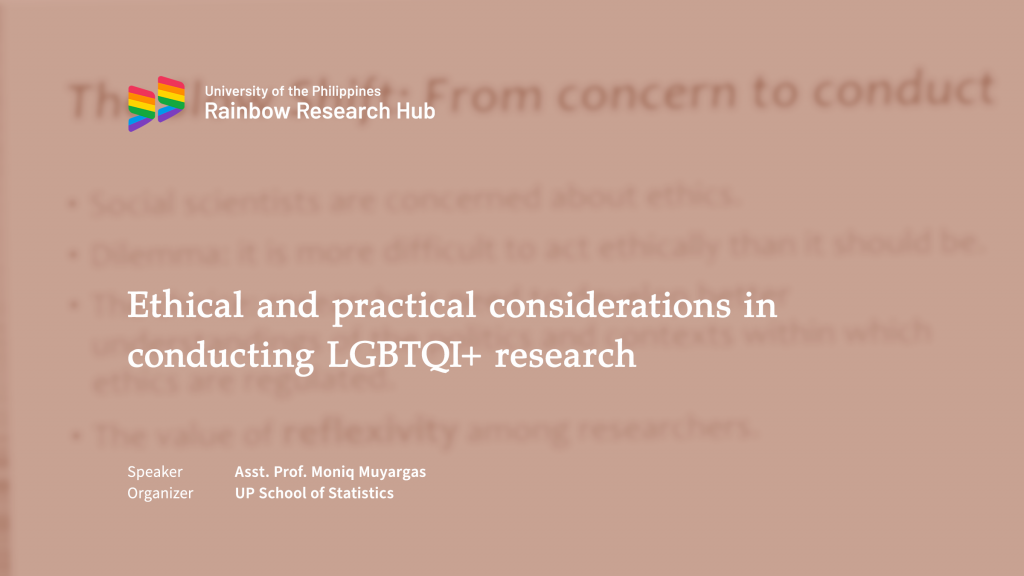
Essence
Prof. Moniq talks about ethics in the context of the social sciences, the pillars and principles of ethical research, as well as the need for reflexivity and sensitivity in understanding the social contexts where the researcher and the respondents belong to. They also discuss other things to consider when conducting LGBTQI research such as the persisting, often harsh, realities of being queer and the need for intersectionality among others.
Speaker: Prof. Moniq M. Muyargas
Organization: UP School of Statistics
Explore
Express
Read the Littman (2018) case study on “rapid-onset gender dysphoria” (ROGD), and using the prompt below, write a 500-word essay on your insights.
- Would you consider this study ethical? If yes, how so? If no, why not? If your answer is somewhere in between yes and no, explain why. Does the study have methodological aspects that you would deem ethical or otherwise? What about conceptual ones?
Engage
When doing a study on LGBTQI Filipinos specifically, would a participant call for “LGBTQI Filipinos” disseminated online/through social media be enough? If yes, how so? If no, why not? How would you recruit participants instead?
The lecture brings up intersectionality as a tool that researchers can use to better determine participant inclusion criteria. How is the concept of intersectionality more broadly related to ethics and doing ethical LGBTQI research? How else can you apply intersectionality in the research process? [These can be follow-up questions to #1.]
- How would you take into account some of the other realities of LGBTQI research while designing your study?
- LGBTQI people being a “hidden population” or one that is “hard to engage”
- Participants experiencing research fatigue
- Participants’ distrust of the researcher and/or the research enterprise
- Participants’ potential to be “outed”
- Researchers’ insider advantage-disadvantage or them having dual relationships with participants (for example, as both researcher-and-friend)
- How would you take into account some of the other realities of LGBTQI research while designing your study?
- When doing LGBTQI research, what can you do during the different stages of the research process (enumerated below) to make sure that your study is ethical?
- Research conceptualization
- Research design and methodology
- Data collection
- Data analysis
- Data reporting
- Research dissemination
Expand
On the Littman/ROGD case study: Biologist and transgender activist Julia Serano wrote two-part essays debunking the concept of “social contagion”—what Littman claims to be the mechanism surrounding “rapid-onset gender dysphoria”—and explaining the misconception that more children and adolescents who are assigned female at birth transition (compared to those assigned male at birth). Serano also links to her other essays on transgender issues, demonstrating her remarkable expertise on these topics.
On conducting ethical LGBTQI research: The LGBT Foundation has a guide on ethical and good research practices (link to download; English) for those who want to do high-quality research on LGBTQI people and communities. Based on the ethical principles of respect for persons, beneficence, and integrity, the guide identifies and answers research and ethics-related questions or concerns, and even exemplifies how to address them during the research process.
On intersectionality: Kimberlé Crenshaw, who coined the term “intersectionality” in this 1991 paper, has a TED talk entitled “The urgency of intersectionality” (link to watch the video; transcript available). In this talk, she explains how people who experience both racism and sexism (and other forms of oppression) also go through greater, and different forms of harm, compared to those who only deal with either one. Should you want to learn more about intersectionality in the context of research, another useful resource is Elizabeth Cole’s 2009 article on intersectionality in research in psychology.
On ethical principles for research on gender and sexually diverse persons: The Montréal Ethical Principles for Inclusive Research takes our knowledge steps further and formalizes ethical standards for research on LGBTQI people and other gender and sexually diverse persons. There are 12 ethical principles in total, all of which extend the core ethical principles of respect for persons, beneficence, fidelity and responsibility, integrity, and justice by determining higher-level and specific action points to ensure that both research and research outcomes are not only inclusive of LGBTQI people but affirmative of their lives and experiences and also equitable.
